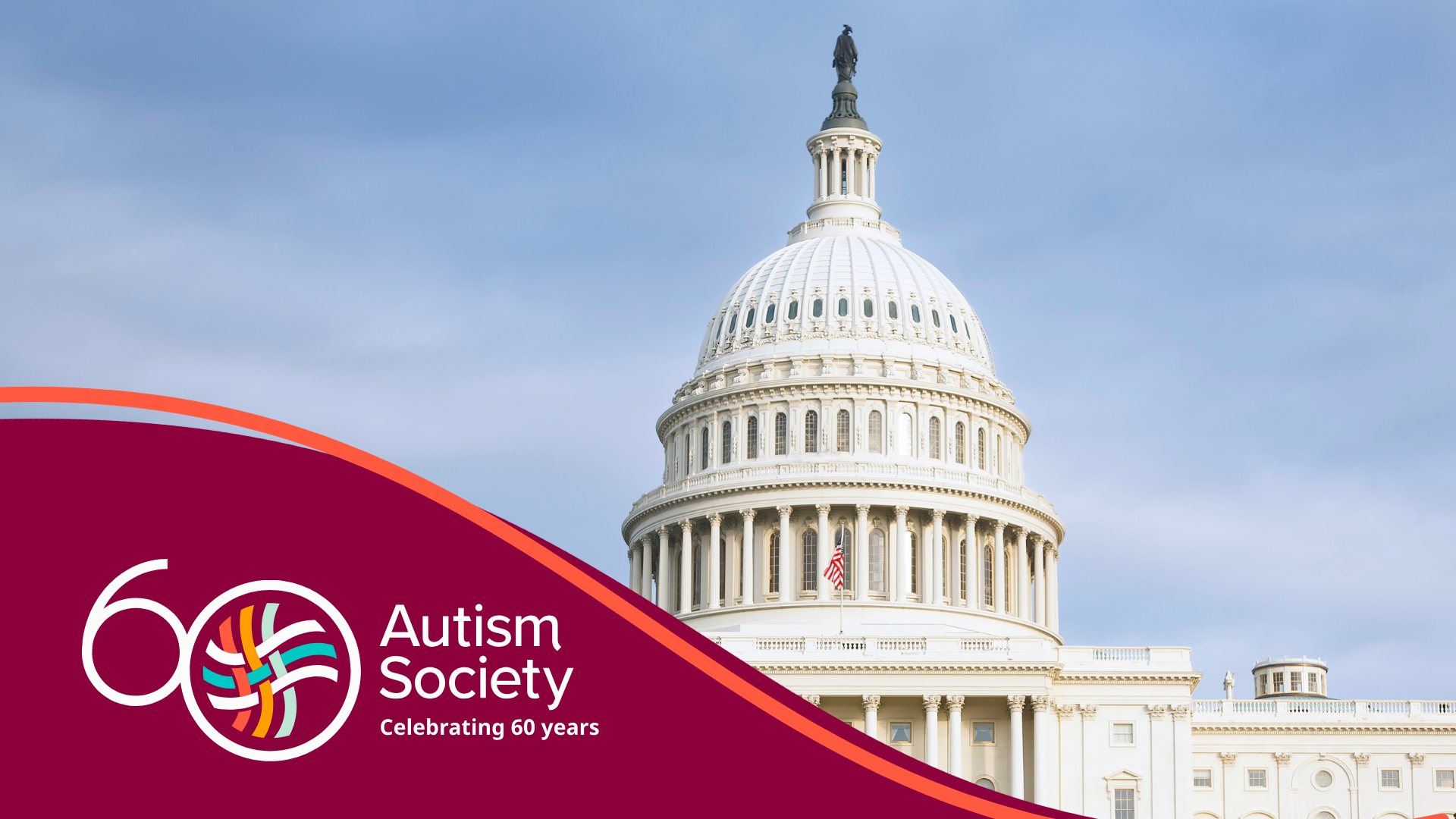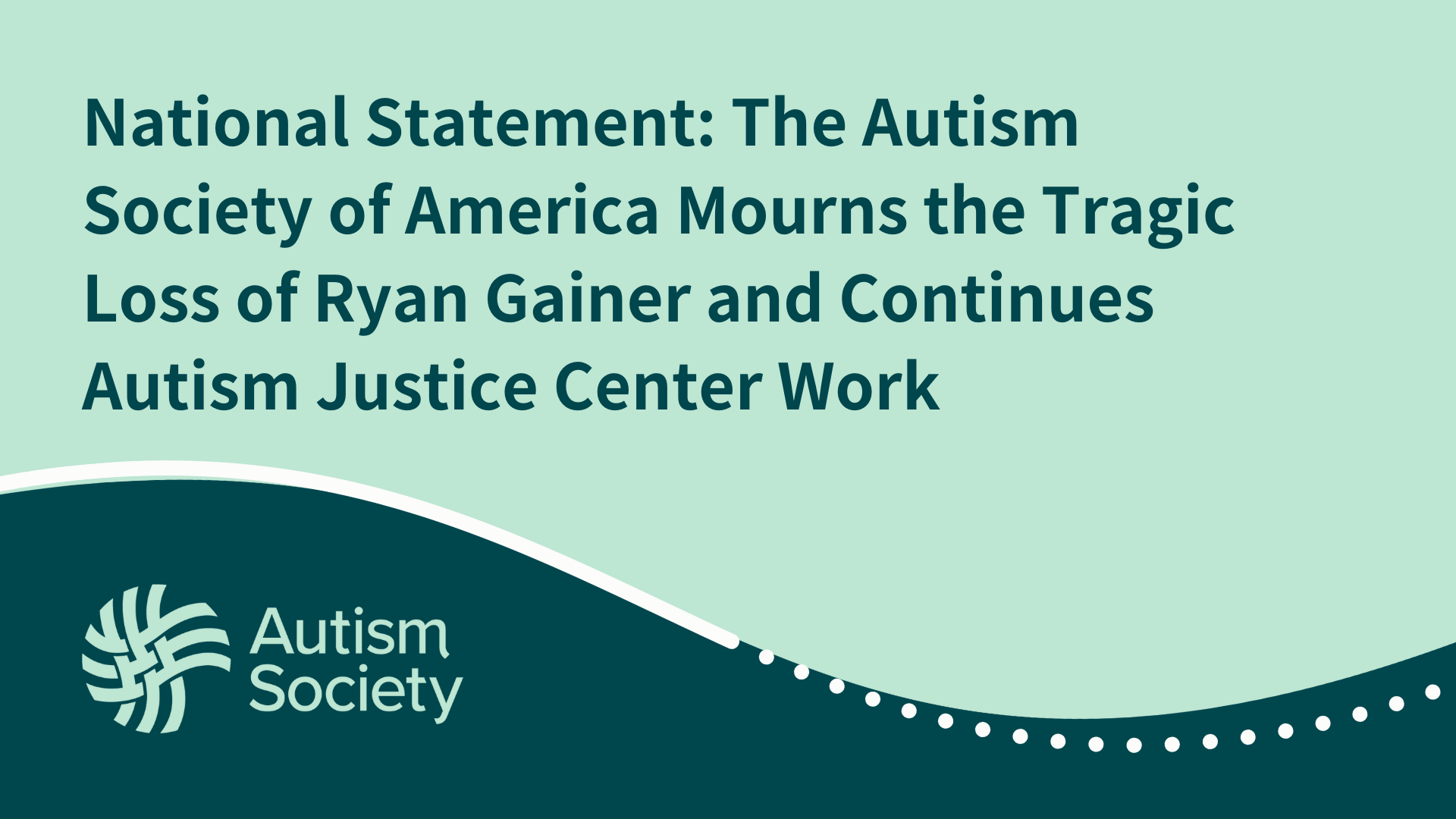
In this issue of Capitol Connection, see information on several important final regulations recently published and Department of Justice settlements pertaining to civil rights and disability services. In addition, find an update on the Autism CARES Act reauthorization and an action taken to advocate for special education funding. Use the Autism Society’s Action Center to educate your Members of Congress on legislative issues important to you and your family.
Legislative Updates
Autism CARES Act
The Autism Society published an opinion piece by Christopher Banks, President and CEO, on the importance of reauthorizing the Autism CARES Act. This piece highlights important provisions of the Autism CARES Act and why it is important to renew it. These provisions include research through the National Institutes of Health (NIH), interdisciplinary training of health providers through the Health Resources Services Administration (HRSA), and surveillance and early screening and interventions through the Centers for Disease Control and Prevention (CDC). The Autism Society is advocating for provisions to increase research on how to help individuals with complex medical and intense support needs, research to help those with unmet communication needs, and increased legal advocacy for those with Autism and their families. Reps. Smith (R-NJ) and Cuellar (D-TX) have introduced a bill in the House (HR 7213). Senator Menendez (D-NJ) is expected to introduce a bill in the Senate soon. Through the Autism Society Action Center, 850 letters were sent to Congress educating Members about the importance of reauthorizing the law.
IDEA Full Funding Coalition
The Autism Society signed a coalition letter urging Congress to put the Individuals with Disabilities on a 10-year glide path to full funding. The letter urges appropriators to provide no less than $16.259 billion for IDEA Part B Grants to States while holding all other education programs harmless from funding cuts. Today, the Full Funding Coalition, of which ASA is a member, hand-delivered the letter to members of the House Appropriations Committee. There is legislation in the House and Senate (S.2217/H.R.4519) that would provide full funding for IDEA over time. For more information and to educate your members of Congress, see the Autism Society Action Alert.
House Hearing on Medicaid
On April 30th, the House Energy and Commerce Health Subcommittee held a hearing: “Legislative Proposals to Increase Medicaid Access and Improve Program Integrity.” Daniel Tsai, Deputy Administrator and Director of the Center for Medicaid and CHIP Services, Centers for Medicare & Medicaid Services (CMS), was the key witness. Committee members grilled him about recent regulations that were recently finalized. Committee members also discussed current legislative proposals to address the direct workforce, reduce waiting lists, and provide more quality nursing homes and home and community-based services. See his full written testimony that outlines some of the recent regulations.
Final Rules
Section 504 Final Rule Published
On May 1st, the U.S. Department of Health and Human Services (HHS), through its Office for Civil Rights (OCR), finalized a final rule that updates and bolsters protections for people with disabilities under Section 504 of the Rehabilitation Act. This long-awaited Final Rule clarifies and strengthens civil rights protections for people with disabilities, addresses discrimination in medical treatment, adds enforceable standards for accessible medical diagnostic equipment, and ensures accessible web content and mobile apps. The final rule also clarifies obligations to provide services in the most integrated setting appropriate to the needs of individuals with disabilities. This is the first comprehensive update since the rule was implemented 40 years ago. The Autism Society commented on the proposed rule and signed on to the more comprehensive CCD comments in October 2023. See also ACL blog from Alison Barkoff. To read the final rule and other fact sheets in multiple languages, see OCR’s Section 504 landing page.
Final Rule on Access to Medicaid Services
On April 22nd, the Department of Health and Human Services and the Centers for Medicare & Medicaid Services (CMS) published the Ensuring Access to Medicaid Services final rule. The rule is intended to improve access to home and community-based services (HCBS). It allows for more oversight to ensure providers are using person-centered plans and establishing a grievance system. The rule will require at least 80 percent of Medicaid payments to go to direct support workers’ wages. States will have to be more transparent in how much they pay for services and how rates are set. States will have to report on waiting lists for Medicaid waiver services (HCBS). The Autism Society provided comments on the proposed rule in July of 2023.
Final Rules on Medicaid and CHIP
CMS also announced a final rule on Medicaid and Children’s Health Insurance Program (CHIP) Managed Care Access, Finance, and Quality. This final rule will help improve access and address health equity issues for Medicaid and CHIP-managed care enrollees. It addresses various services, including timely access to care by creating appointment wait time standards, state monitoring and enforcement, and payment burdens, and establishes a quality rating system.
Social Security Administration Implements Nationwide SSI Benefit Calculation
The Social Security Administration finalized a rule this month to adjust how it calculates Supplemental Security Income (SSI) benefits, specifically regarding the treatment of “in-kind support and maintenance” in the form of rental subsidies. Currently, beneficiaries often see their benefits reduced if their housing costs are lower than market value, but this varies across states. This new standard will potentially increase SSI payments for about 41,000 people to qualify for SSI annually. This change aims to improve program equity and streamline administrative processes.
Final Rule on Accessibility of Web Content
The U.S. Department of Justice issued a final rule under Title II of the ADA to ensure the accessibility of web content and mobile applications (apps) for people with disabilities. State and local governments have two to three years, depending on their populations, to comply with the new obligations to make their websites and mobile applications accessible. Websites and apps are crucial parts of everyday life for all Americans, and so it is critical that they are fully accessible.
Guidance on Voting Rights
New guidance from Assistant Attorney General Kristen Clarke addresses the voting rights of people with disabilities, emphasizing that voting is a fundamental right often hindered by discriminatory barriers. It highlights issues such as inaccessible polling places, prejudicial assumptions, and inaccessible ballots, and emphasizes the importance of federal civil rights laws, including the Americans with Disabilities Act, in safeguarding the voting rights of all Americans, including those with disabilities. The document provides guidance to states, local jurisdictions, election officials, poll workers, and voters on how the Americans with Disabilities Act and other federal laws help ensure fairness in the voting process for people with disabilities.
Related to voting, the Autism Society has an Election Center that allows users to find out where to register to vote, where to vote and to see the candidates in the user’s state.
ADA Settlement Agreement
The Justice Department announced a settlement agreement with the City of Virginia Beach, Virginia, to ensure that individuals with disabilities have equal access to city buildings and other civic programs. The agreement is part of the department’s commitment to ensure that civic institutions comply with the Americans with Disabilities Act (ADA). Under the agreement, Virginia Beach will remove accessibility barriers to buildings such as police stations, libraries, technology centers, community centers and places of recreation. For more information on the ADA, please call the department’s toll-free ADA Information Line at 800-514-0301 (TDD 800-514-0383) or visit www.ada.gov. If you believe your civil rights have been violated, you may file a complaint online at www.civilrights.justice.gov/.
Justice Corner
Briefing on Autism, Foster Youth, and Co-morbidity in the BIPOC Community
Carlean Ponder, Director of the Autism Justice Center represented the Autism Society at the Special Needs Network congressional briefing on Autism, Foster Youth, and Co-morbidity within the BIPOC community, shedding light on critical issues and advocating for tailored interventions. Sponsored by Representative Sydney Kamlager-Dove (D-CA), the event delved into the multi-faceted challenges faced by BIPOC individuals with intersectional identities. Speakers including Areva Martin, founder of the Special Needs Network, Mary Lee, Ingrid Rivera-Guzman, Kristin Jacobson, and Dr. Amy Woods, emphasized the urgent need for inclusive policies and support systems to address intersecting issues. The briefing was an important platform for collaboration and dialogue, leading to steps towards equity for marginalized communities.
Share:




